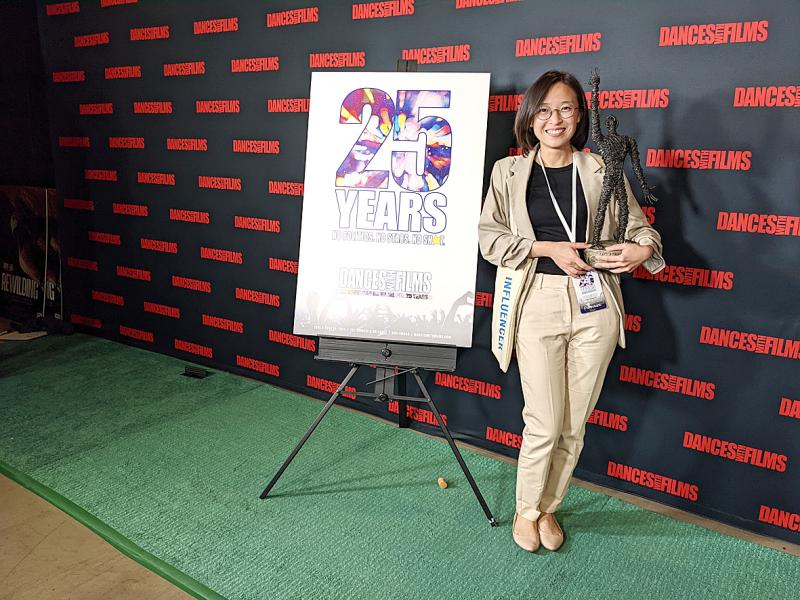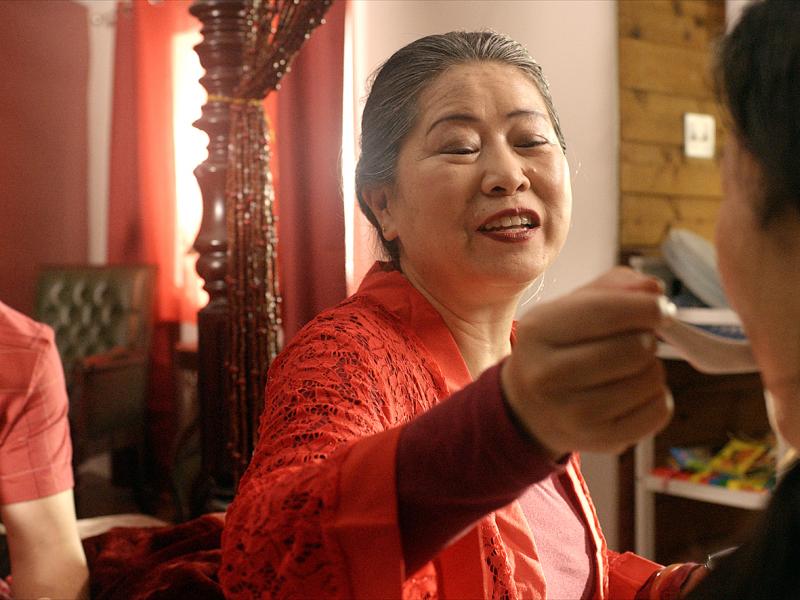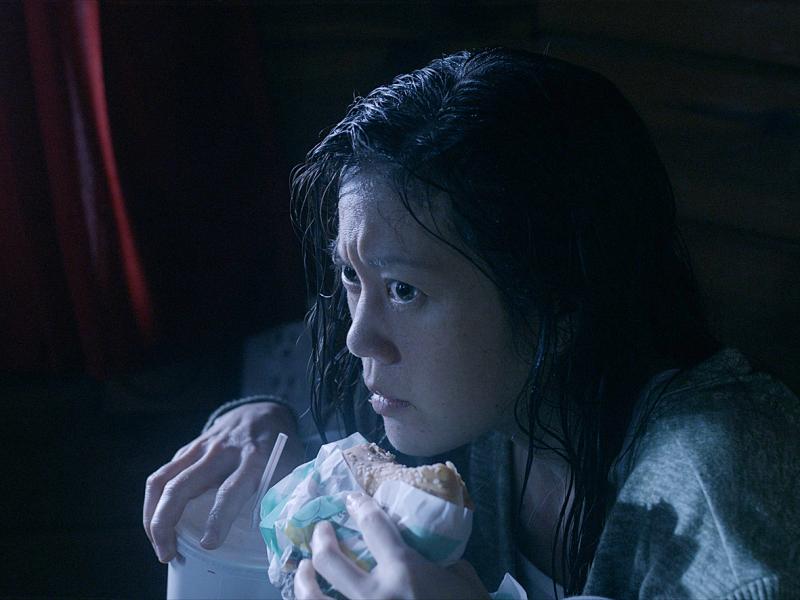In the short film A Dire Strait, Taiwanese-American protagonist Demi is confined to her bed, forced to eat the same food everyday and forbidden to shower. She even has to urinate in a jar, and her nightmare begins when she tries to secretly resist the rules.
This “dark comedy/thriller” is actually about a ritual that most postpartum Taiwanese and Chinese women still partake in: zuoyuezi (坐月子, sitting for one month), which is meant to help their “broken” bodies recover and produce the best quality milk for their newborn. Demi’s captors are her in-laws, whose round-the-clock surveillance is driving her mad.
US-based Taiwanese director Lin Liang-chun (林亮君) says that while the film features the strictest version of the tradition and is partially based on what her mother went through, she’s found that many younger mothers still go through similar restrictions. The COVID-19 pandemic’s quarantine measures also served as inspiration, as more people are now able to empathize with the zuoyuezi experience of isolation.

Photo courtesy of Lin Liang-chun
“The confinement element of zuoyuezi is actually very suitable for a thriller film,” Lin says. “But the nature of the genre requires me to portray the most extreme version of the practice. I tell people at screenings that not every family is like this, and this is not an anti-zuoyuezi movie.”
However, the cultural standards of being a “good mother” and the pressure “to prioritize family over self-care while also doing it in a ‘right’ way that pleases elders” is real, and still passed down through each generation by women who endured it themselves, Lin says.
A Dire Strait won the Grand Jury Award for shorts at last month’s annual Dances With Films festival in Los Angeles for independent productions, and Lin hopes to show it at upcoming cinema events in Taiwan.

Photo courtesy of Lin Liang-chun
LITTLE KNOWN PRACTICE
Lin says her mother frequently talked about her painful zuoyuezi experience. She had to sneak food into her room, and although it was the sweltering Taiwanese summer, she had to wear a sweater and was forbidden from using a fan or even opening the window even after she developed a severe heat rash.
While many American viewers have never heard of the practice, Lin found that Taiwanese and Chinese mothers in the US often go through stricter experiences than their counterparts in Asia.

Photo courtesy of Lin Liang-chun
“Since immigrants are afraid of losing their culture and roots, they try even harder to preserve them,” Lin says. “Many mothers and mothers-in-law here are way more traditional than the ones in Taiwan.”
Plus, women in Taiwan can go to postpartum centers where there’s significantly less pressure, but these facilities are very expensive and rare in the US, so it’s more common for the parents to carry out the practice. Lin hopes to go beyond the more common Asian-American topics and present more of these lesser-known cultural issues to Western audiences.
The film also contains subtle references to cross-strait politics, especially with the title: the in-laws wear red, the husband, who mostly goes along with his parents, is clad in blue, while Demi appears in green.
“So far, only Taiwanese and Chinese have been able to pick up on this, while Americans not so much,” Lin says. “But it doesn’t matter, the most important thing is to tell a good, character-driven story. The conflict between collectivists and individualists naturally occurs in that family.”
MOTHER’S AWAKENING
A Dire Strait is also a shout-out to Lin’s mother, who began pursuing her own path after decades as the “good daughter-in-law.”
When she was nearly 60 years old, Peng Su-hua (彭素華) enrolled in the Graduate Institute of Children’s Literature at National Taitung University and began hanging out with women more than half her age.
“It took my mom, the most talented woman I know, 30 years to find out what she wanted to do with her life other than being a mother,” Lin says.
Lin’s next project is a feature-length film based on Peng’s latest novel, Grandmas’ Bikini (奶奶們的比基尼), which was published last year. It tells the story of four grandmas who embark on a road trip after one of them is diagnosed with a cyst in her breast that needs to be removed.
“They decide to go to the beach and wear bikinis to celebrate their bodies,” Lin says. “They bring an annoying granddaughter along, and the story is told from her perspective.”
Although it’s a humorous story, Lin found herself in tears as she leafed through the pages, as she saw bits of her mother in each of the grandmas.
“I knew that the story symbolized her feminist awakening process,” she says. “These grandmas breaking free of family pressure and searching for themselves totally symbolizes my mother’s journey of self-discovery.”

This month the government ordered a one-year block of Xiaohongshu (小紅書) or Rednote, a Chinese social media platform with more than 3 million users in Taiwan. The government pointed to widespread fraud activity on the platform, along with cybersecurity failures. Officials said that they had reached out to the company and asked it to change. However, they received no response. The pro-China parties, the Chinese Nationalist Party (KMT) and Taiwan People’s Party (TPP), immediately swung into action, denouncing the ban as an attack on free speech. This “free speech” claim was then echoed by the People’s Republic of China (PRC),

Exceptions to the rule are sometimes revealing. For a brief few years, there was an emerging ideological split between the Democratic Progressive Party (DPP) and Chinese Nationalist Party (KMT) that appeared to be pushing the DPP in a direction that would be considered more liberal, and the KMT more conservative. In the previous column, “The KMT-DPP’s bureaucrat-led developmental state” (Dec. 11, page 12), we examined how Taiwan’s democratic system developed, and how both the two main parties largely accepted a similar consensus on how Taiwan should be run domestically and did not split along the left-right lines more familiar in

Many people in Taiwan first learned about universal basic income (UBI) — the idea that the government should provide regular, no-strings-attached payments to each citizen — in 2019. While seeking the Democratic nomination for the 2020 US presidential election, Andrew Yang, a politician of Taiwanese descent, said that, if elected, he’d institute a UBI of US$1,000 per month to “get the economic boot off of people’s throats, allowing them to lift their heads up, breathe, and get excited for the future.” His campaign petered out, but the concept of UBI hasn’t gone away. Throughout the industrialized world, there are fears that

Most heroes are remembered for the battles they fought. Taiwan’s Black Bat Squadron is remembered for flying into Chinese airspace 838 times between 1953 and 1967, and for the 148 men whose sacrifice bought the intelligence that kept Taiwan secure. Two-thirds of the squadron died carrying out missions most people wouldn’t learn about for another 40 years. The squadron lost 15 aircraft and 148 crew members over those 14 years, making it the deadliest unit in Taiwan’s military history by casualty rate. They flew at night, often at low altitudes, straight into some of the most heavily defended airspace in Asia.